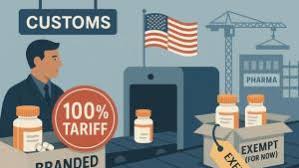Weaponising health care: On the Trump tariffs on imported medicines.
Americans will see medical bills shoot up due to Donald Trump’s actions.
By announcing 100% tariffs on imports of branded and patented medicines, with effect from October 1, U.S. President Donald Trump has weaponised access to health care in America, where prescription drugs account for about 10% of household medical care spending. The caveat of a 15% tariff cap on imports from the European Union and Japan, which the U.S. has clarified that it will honour, blunts the announcement, as these two jurisdictions account for nearly three-fourths of pharma imports. Much of this trade consists of patented medicines such as the Danish-made weight-loss and anti-diabetes drugs, Wegovy and Ozempic. The impact on patients needing specialised cancer or rare disease drugs could also be severe. There will also be a likely impact on the U.S.’s health insurance sector, as firms would attempt to pass on higher prices of specialty and patented medicines on to policyholders. An Ernst & Young study found that a 25% tariff on patented drugs would raise annual drug costs by about $51 billion. The countries most exposed are those left outside the exemptions. The U.K., Switzerland, and Singapore — hubs for pharma manufacturing — face the prospect of a 100% tariff burden, which could make their products expensive.
India’s sprawling generics industry has, for the moment, been spared. Generics account for 90% of prescriptions dispensed in the U.S. but about 13% of spending. India exported more than $10.5 billion worth of formulations to the U.S. in FY25. Any tariff expansion to cover generics or biosimilars could, therefore, deal a blow to one of India’s most successful export sectors. There is also lingering uncertainty over whether Active Pharmaceutical Ingredients (APIs) will be caught in the tariff net. India and China dominate global API supply. The U.S. itself remains a leading producer of innovative medicines, exporting billions of dollars’ worth of drugs worldwide. How the new tariffs on imported patented drugs will interact with the price competitiveness of U.S. exports remains unclear. Mr. Trump’s move came despite objections from the influential body, PhRMA, which warned that tariffs would raise costs for patients without addressing structural supply chain issues. For Americans, this decision will almost certainly push up retail drug costs for advanced therapies. For the world, the move is a reminder that global supply chains forged in the post–Second World War order are being reshaped by new political realities. Nations heavily dependent on U.S. demand must accelerate alternative trade alliances and diversify export markets. This is now a necessity for India’s pharma sector as well.
